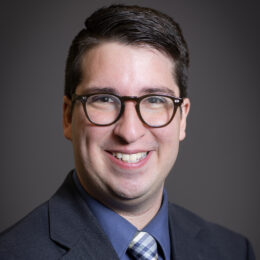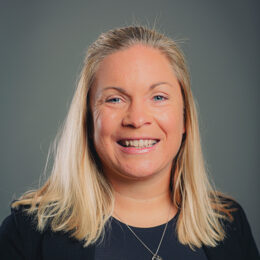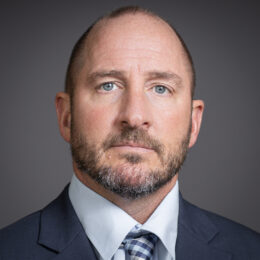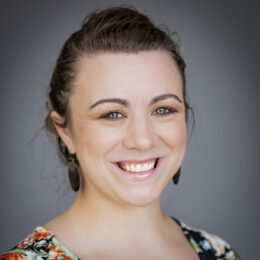Master of Athletic Training
Prepare for a dynamic health care career with Manchester University’s Master of Athletic Training program. This CAATE-accredited degree combines classroom instruction with immersive clinical experiences. Graduates are prepared to become certified athletic trainers and work in diverse settings, including sports teams, schools, clinics, medical facilities, performing arts organizations, and more.
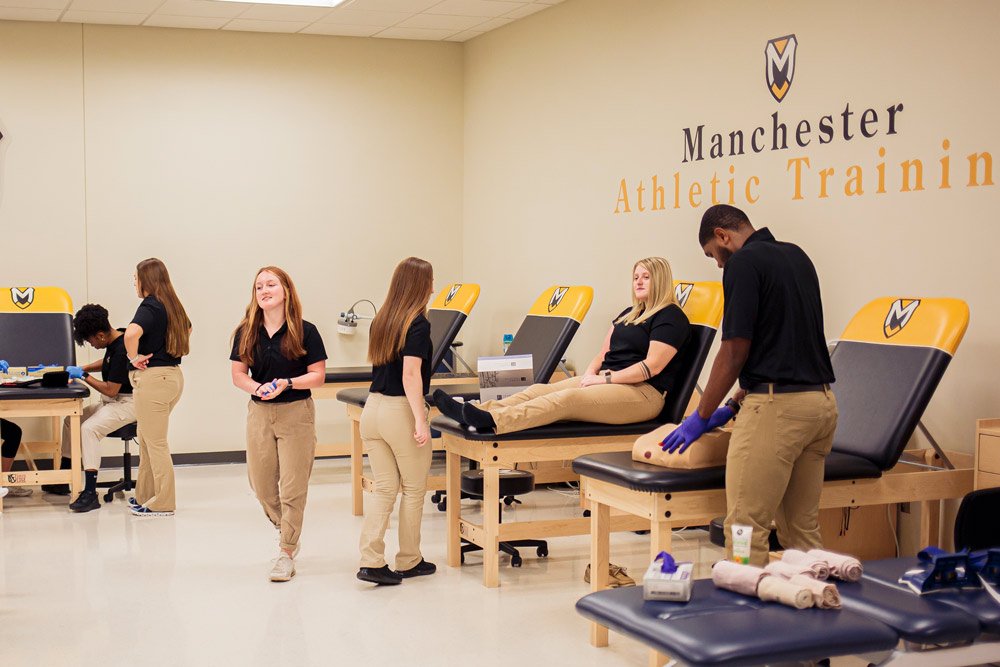
Get Your Athletic Training Master’s at Manchester University
Manchester University’s Master of Athletic Training program blends classroom instruction with 25 weeks of immersive clinical experience, giving students hands-on training in injury risk reduction diagnosis, emergency care, and rehabilitation. Whether you’re working with sports teams, schools, clinics, medical facilities, performing arts organizations, or government agencies, you’ll be prepared to deliver high-quality care and promote wellness in diverse environments.
Graduates are fully prepared to sit for the Board of Certification (BOC) exam and enter the workforce as confident, capable athletic trainers—ready to lead and innovate in the field of sports medicine.
Program Information:
- 62 Credit Hours
- 32 weeks Clinical Experience
- Public Resources
Location
- Fort Wayne


Cassandra Horn, MAT, Class of 2023
Why Choose MU for Your Athletic Training Master’s?
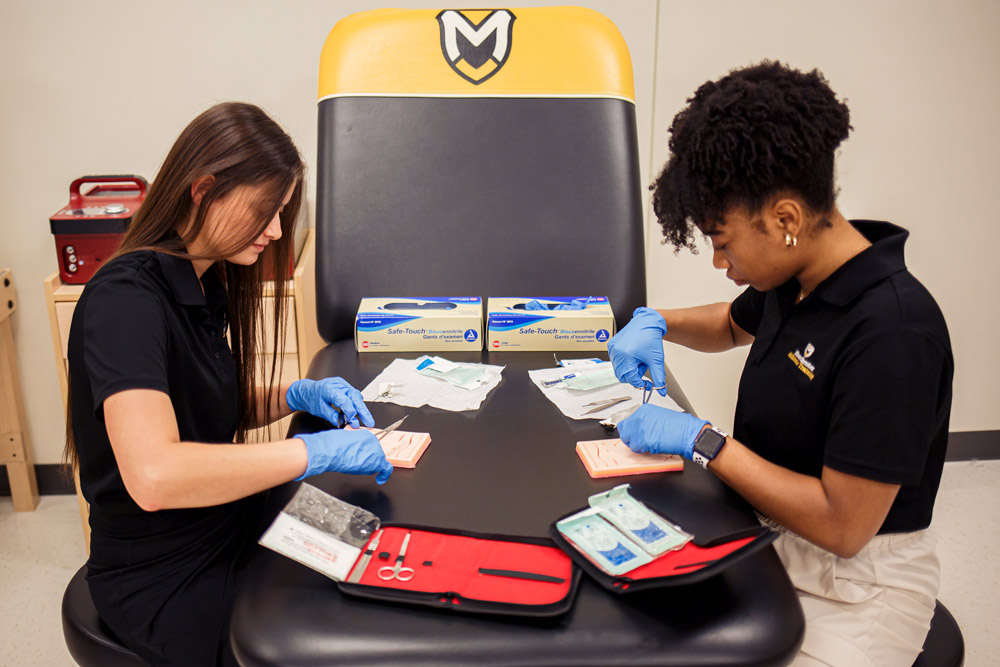
Personalized Clinical Experience
State-of-the-Art Facilities
Immersive Experiential Learning
Complete three 7-week clinical immersions, one 11-week immersion, and a variety of rotations in settings like high schools, colleges, universities, and professional sports.
What You Can Do With Your Athletic Training Degree
Certified Athletic Trainer
Provide immediate care, injury assessment, and rehab for active populations.
Clinical Athletic Trainer
Work in hospitals or orthopedic clinics supporting recovery and prevention.
College or University Athletic Trainer
Support student-athletes in collegiate athletic departments or sports programs.
Industrial or Occupational Athletic Trainer
Help prevent and treat workplace injuries in industrial environments.

Salary Expectations for Master of Athletic Training Graduates
In 2023, full-time certified/licensed athletic trainers reported an average national salary of $68,907. This marks an 11 percent increase, equivalent to $6,909, compared to the 2021 average national salary of $61,998. Over the past five years, the average salary has notably increased by more than $11,700. Compared to 2022 salary data from the Bureau of Labor Statistics, the average salary of athletic trainers from the survey rests above the average annual wage for all occupations ($61,900), but below the average annual wage for all healthcare practitioners and technical occupations ($96,770).
National Athletic Trainers’ Association. 2023 Salary Survey Executive Summary. April 2, 2024. Available at: https://www.nata.org. Accessed August 11, 2025.
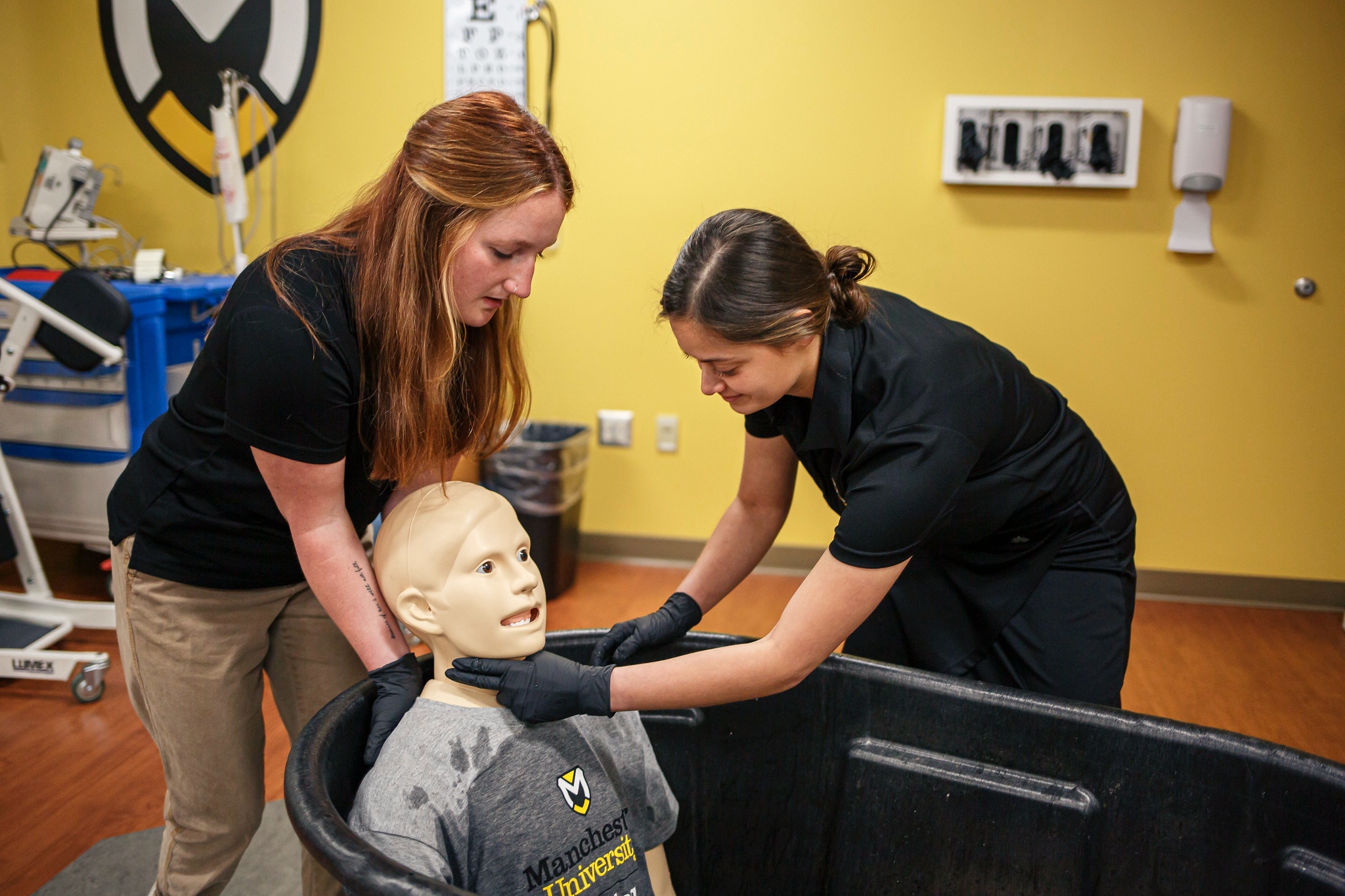
How the MAT Program Supports Your Growth
CAATE Accredited
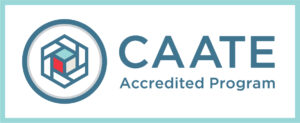
Manchester University’s CAATE-accredited Master of Athletic Training (MAT) program prepares students to become collaborative, patient-centered healthcare professionals ready to thrive in today’s fast-paced and evolving athletic training landscape. With a strong foundation in clinical knowledge, ethical practice, and interprofessional teamwork, our graduates are equipped to make a meaningful impact across a wide range of settings.
In compliance with U.S. Department of Education regulations 34 CFR 668.43 (a) (5) (v) and 34 CFR 668.43 (c) the Manchester University Athletic Training program acknowledges the curriculum meets educational requirements for the Board of Certification (BOC) examination, recognized as the required examination for professional regulation in all states.
Student and Publicly Available Resources
Clinical Rotations
Clinical education is designed to provide experiential learning opportunities through supervised participation in athletic training practice. Experiential education opportunities were developed following the mission and vision of Manchester University’s Master of Athletic Training Program and the guidelines set forth by the Commission on Accreditation for Athletic Training Education (CAATE). During the program, students will complete a series of clinical rotations which will provide them with opportunities to integrate the knowledge and skills learned in the classroom while out on clinical rotation working with diverse patient populations where athletic trainers commonly practice. Students are supervised by selected preceptors who are expected to guide and mentor the student in applying knowledge learned in the classroom, techniques learned in the laboratory, and compassion learned through life experience, with the goal of improving the health of the patient.
Preceptors from many different practice settings actively participate in these learning opportunities to develop experiences that will prepare students to become their colleagues now and in the ever-changing future. When completed, MAT students will have had the possible opportunity to work with Division I, Division III NAIA, and high school, and nontraditional patients. For further information regarding clinical sites please reach out to mat@manchester.edu.
The athletic training master’s program features a wide range of clinical settings and patient populations. Students rotate through high schools, colleges, orthopedic clinics, sports medicine centers, and industrial environments. This comprehensive clinical training ensures that students graduate ready to succeed as certified athletic trainers, confident in their ability to provide exceptional care and lead in a variety of professional settings.
Experiential Learning Opportunities
Students enrolled in Manchester University’s athletic training master’s program engage in a wide range of experiential learning activities designed to mirror real-world clinical practice. From hands-on work in simulation labs to rotations in schools and orthopedic clinics, students gain practical experience using the tools and technologies commonly employed by health care professionals in athletic training and sports medicine clinics.
This includes training in therapeutic modalities, clinical evaluation procedures, and concussion management protocols. By combining academic knowledge with direct application, these opportunities prepare students to make informed decisions in high-pressure environments—fostering the professional confidence required for a career in athletic training.
These experiences not only reinforce classroom instruction but also enhance the ability of athletic training students to render service in diverse clinical settings while working under direct supervision of licensed practitioners.
Facilities
At our Manchester University Fort Wayne location, we’re excited for the expanded opportunities that we’ll be able to offer to MAT students, including newer facilities, more opportunities for clinical experiences, stronger collaborations with our other professional health science programs, and all of the amenities offered by the vibrant, progressive city of Fort Wayne!
Situated in the heart of Fort Wayne’s northern medical district on Dupont and Diebold Roads, Manchester University’s Fort Wayne locations is near the Interstate 69 exit, with easy access to health care facilities and pharmacies throughout northeast Indiana. This 92,000-square-foot LEED Gold certified building features state-of-the-art facilities and attractive, contemporary settings featuring flexible spaces and top-rate technology.
In addition to technologically “smart” classrooms, offices, spectacular spaces and a large new conference center, athletic training students will have access to the profession’s latest equipment and facilities.
Manchester University Fort Wayne is located at 10627 Diebold Road, Fort Wayne IN, 46845, just east of Interstate 69 at the Dupont Road exit.
Graduate Research Projects
As part of the Master of Athletic Training program, each student completes a graduate-level research project focused on a critical topic in athletic training education or clinical practice. These projects emphasize evidence-based practice and allow students to contribute to the growing body of knowledge that shapes the profession.
Research topics may explore risk reduction, therapeutic intervention, or advancements in health science related to human movement and performance. Students receive mentorship from faculty with expertise in sports medicine, clinical diagnosis, and health care delivery, ensuring high-quality scholarship and academic rigor.
This capstone experience reinforces the program’s focus on professional development, while also preparing graduates to pursue continued research, doctoral study, or leadership roles in athletic training and related health care fields.
Professional Organizations
Master of Athletic Training – Professional Organizations
![]()
Athletic Training Centralized Application System

Board of Certification for the Athletic Trainer
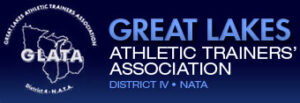
Great Lakes Athletic Trainers Association

Indiana Athletic Trainers Association

National Athletic Trainers Association
![]()
Student Groups
Athletic training students in Manchester University’s athletic training master’s program benefit from a supportive academic environment that extends beyond the classroom. Through active involvement in academic and professional student organizations, students enrolled in the program build lasting peer networks, gain leadership experience, and engage in meaningful collaboration.
These student groups offer opportunities for personal and professional growth, encouraging students to learn from peers, alumni, and faculty mentors while participating in events focused on health care, athletic performance, and community service. Activities may include service projects, guest speaker sessions, professional development workshops, and national athletic training conferences.
Participation in student organizations also strengthens soft skills like communication, critical thinking, and teamwork—key attributes for future health care professionals working in athletic training, sports medicine clinics, and beyond. Whether you’re looking to expand your network or step into a leadership role, Manchester’s MAT program provides multiple avenues to grow within a dynamic and collaborative learning environment.

Curriculum
The Best of Both Worlds
Master of Athletic Training students at Manchester get the best of both worlds – small class sizes and personal attention from highly skilled faculty that ensure you understand the lessons you learn in the classroom, and big opportunities to put those lessons to work with practical experience in the field.
Your lessons in the classroom include the foundations, administration and ethics involved with athletic training, and at our new Fort Wayne location, you’ll work with new, state-of-the-art testing and simulation equipment.
In the field, clinical experiences await in Fort Wayne’s medical community and with professional, college and high school sports teams, and they start your first semester in the program.
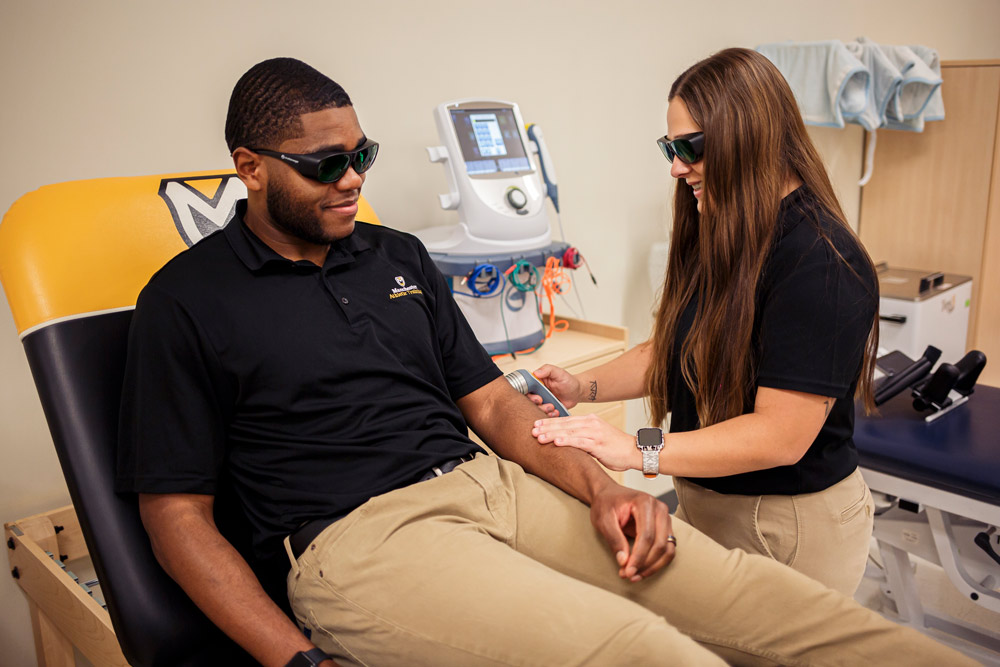
Year 1
ATTR 502 Clinical Practice I | 5.0
ATTR 521 Immediate and Emergency Care | 2.0
ATTR 531 Injury Classification & Management | 2.0
ATTR 512 Clinical Skills I | 2.0
ATTR 563 Pharmacy Principles for Athletic Trainers | 2.0
ATTR 506 Clinical Practice II | 5.0
ATTR 526 Musculoskeletal Assessment I | 3.0
ATTR 536 Musculoskeletal Assessment II | 3.0
ATTR 522 Clinical Skills II | 2.0
ATTR 592 Athletic Training (Elective)* | 1.0-3.0
Total Credit Hours: 26.0-29.0
*ATTR 592 can be taken during any semester up to a total of 3 credit hours.
Year 2
ATTR 603 Summer Clinical Practice (Required for ’24) | 4.0
ATTR 633 Medical Aspects | 3.0
ATTR 643 Healthcare Administration | 2.0
ATTR 616 Clinical Practice III | 6.0
ATTR 612 Clinical Skills III | 2.0
ATTR 622 Therapeutic Interventions I | 3.0
ATTR 632 Therapeutic Interventions II | 3.0
ATTR 655 Preparation for Professional Practice | 1.0
ATTR 652 Clinical Practice IV | 6.0
ATTR 662 Clinical Skills IV | 2.0
ATTR 672 Athletic Training Seminar | 2.0
ATTR 682 Behavioral Medicine | 2.0
ATTR 592 Athletic Training (Elective)* | 1.0-3.0
Total Credit Hours: 36.0-39.0
Clinical Rotations
Gain Clinical Experience
Clinical education is designed to provide experiential learning opportunities through supervised participation in athletic training practice. Experiential education opportunities were developed following the mission and vision of Manchester University’s Master of Athletic Training Program and the guidelines set forth by the Commission on Accreditation for Athletic Training Education (CAATE). During the program, students will complete a series of clinical rotations which will provide them with opportunities to integrate the knowledge and skills learned in the classroom while providing care to a live client/patient population where athletic trainers commonly practice. Students are supervised by selected preceptors who are expected to guide and mentor the student in applying knowledge learned in the classroom, techniques learned in the laboratory, and compassion learned through life experience, with the goal of improving the health of the patient.
Preceptors from many different practice settings actively participate in these learning opportunities to develop experiences that will prepare students to become their colleagues now and in the ever-changing future. When completed, MAT students will have had experience with varied practice settings and patient populations. Among these, clinical rotation sites* include:
Northeastern Indiana Clinical Sites
-
Bishop Dwenger High School
- Canterbury High School
- Carroll High School
- Central Noble High School
- Churubusco High School
- Dekalb High School
- Fort Wayne Ballet
- Homestead High School
- Huntington North High School
- Huntington University
- Lakewood Park Christian School
- Manchester High School
- Manchester University
- Midwest Concussion Clinic
- New Haven High School
- Northrop High School
- Norwell High School
- OrthoExpress Parkview Sports Medicine
- Peyton’s Northern Distribution Warehouse
- Purdue University Fort Wayne
- South Side High School
- Trine University
- United Natural Foods, Inc
- University of Saint Francis
- Wayne High School
Our Diverse Nation-Wide Partners
- Advanced Orthopedics
Bowling Green, Ohio - Bowling Green State University
Bowling Green, Ohio - Centerville High School
Centerville, Indiana - Hobart High School
Hobart, Indiana - Michigan State University
East Lansing, Michigan - MyoFit Mobility & Therapy
Indianapolis, Indiana - ProTeam Tactical Care Clinic
Indianapolis, Indiana - South Haven High School
South Haven, Michigan - Southern Illinois University
Carbondale, Illinois - University of Indianapolis
Indianapolis, Indiana - University of North Texas
Denton, Texas
Multi-Site Health Systems
- Indiana Physical Therapy
- Optimum Performance Sports
- Reid Health
*This list is not exhaustive as relationships with new clinical sites are regularly evolving. Student placements are determined based on a myriad of factors including preceptor/student compatibility, preceptor availability, and clinical site restrictions.
Graduate Research
Student Research Projects
An original research project is no longer a graduation requirement for the MAT program; however, below is a listing of completed projects from MAT program alumni.
William Stahley ‘21 – Identifying Risk Factors for Patellofemoral Pain Syndrome in Division III Cross Country Runners: A Prospective Study
Erin Orttel ’20 – Comparing the Acute Effects of Heating and Foam Rolling on Hamstring Extensibility
Ignacio Ubilla ’20 – Comparing the Effectiveness of Heating on Hamstring Flexibility in the Graston Technique© Protrocol
Lauren Ehle, ’19 – Comparing the effectiveness of instrument-assisted soft tissue mobilization and cupping therapy on hamstring
Rachel Brown, ’18 – A Comparison Between Balance Training in the Light versus Balance Training in the Dark
Lauren Burish, ’18 – Implementing Athletic Training Services within the Healthcare Model for the Law Enforcement Population: A Systematic Review
Trevor Engle, ’18 – Comparison of EMG levels between Written, Verbal, or instructional video while performing a prone hip extension
Alexandra Furnish, ’18 – Upper Extremity Physical Adaptations in Healthy Active Individuals Throughout a 4-Week Cupping and/or Resistive Elastic Band Regimen
Emily Giorgi, ’18 – The long-term effects of muscle energy techniques and foam rolling on the hip and low back
Tyler Hudson, ’18 – The effect of a warm-up and cool down on blood lactate peak concentration after sub-maximal exercise
Jennifer Lichtman, ’18 – Comparing the Effectiveness of Kinesiology Tape Brands on Facilitation of the Rectus Femoris Muscle in Healthy Adults
Ciara Maxwell, ’18 – NormaTec and Bio-Cryo effects in Blood Lactate Concentration
Tyler Parish, ’18 – Effects of Therabands, Dumbbells, and Manual Resistance Exercises On Shoulder Strength For A Rehabilitative and Preventative Program
Ellynn Rolett, ’18 – Prevalence of Self-Reported Mental Health Symptoms and Help-Seeking Attitudes in Division III Collegiate Athletes
Jack Ruhl, ’18 – The effects of an at-home stretching program on upper quadrant Y balance scores on the CrossFit athletes
Robbiccaa Williams, ’18 – Effects of Music Intervention on Mood State, Mindfulness, and Motivation during Therapeutic Exercises
Bridgette Banks ’17 – Effects of Contrast Baths vs. Active Recovery and Accelerated Decrease of Lactic Acid Level
Emily Jacob ’17 – The Relationship Between Lower Extremity Flexibility and Balance Scores in Active Older Adults<
Brian Kehe ’17 – Effects of Tissue Flossing on a College Age Population
Emily Kenyon ’17 – The Effect of Dynamic Stretching vs. Sound Assisted Soft Tissue Mobilization on Hamstring Fatigue
Cayla Pusey ’17 – The Effect of Hip Strength on the Star Excursion Balance Test
Aubrey Smith ’17 – Integrating Foam Rolling as a Recovery Regimen in Multi-Event, Distance, Track Athletes
Shelby Archable, ’16 – The Effectiveness of Wicking Clothing for Cooling Out-Of-Season Collegiate Football Players During Exercise
Bryan Black, ’16 – A Comparison Between Cupping And Heat Pack Treatment On Hamstring Flexibility
Ben Charles, ’16 – Duration of the Short Term Range of Motion Changes During Activity Due to Two Stretching Protocols
Kayla Parkos, ’16 – The Effects of Kinesio® Tape Application on Lower Extremity Exercise Scores Using a Functional Movement Screen
Darshan Shah, ’16 – Comparison of the SwayTM Balance Mobile Application with the Berg Balance ScaleTM
Jordan Weitzell, ’16 – The Effect of Augmented Feedback During a One Month Jump-Landing Program
Primmer Zook, ’16 – Comparing Medical Services Provided to Indiana 1A and 2A Secondary School-Aged Athletes in Rural and Urban Institutions
Brent Beck, ’15 – The Impact of Fatiguing Exercise on BESS and SAC Sideline Consussion Test Scores in Recreational Athletes
Maritza E. Chavez Stahly, ’15 – The Effects of Multiple Exposure on Learning Sideline Concussion Tests in College-Age Baseball Players
Demetria Fleming, ’15 – The Comparison of a Balance Training Program Versus a Resistive Training Program to Improve Ankle Strength
Nicole Junk, ’15 – Effects of a Home Breathing Exercise on Quality of Life in Asthmatic Patients Who Use Daily Medication for Symptom Control
Kylee Ort, ’15 – The Use of Laser Therapy for Treatment of a Damaged Bicep Due to Weight Training of the Non-Dominant Arm
Andrea Sherva, ’15 – The Impact of Music Genres on Running Performance in Recreationally Active Individuals
Lindsey Stiffler, ’15 – The Impact of Parents’ Knowledge of Concussions and Its Influence on Children’s Participation in Sports
Two-Year Master’s or 3+2?
Two-Year Master's in Athletic Training
For students who’ve already earned a bachelor’s degree and are looking to earn the credentials for a career in athletic training, the two-year Master’s in Athletic Training program would be the right fit. This program is designed for those whose degrees are in disciplines other than athletic training. This is a two-year, accredited, professional master’s degree program.
Athletic Training 3+2 (or 4+2)
This program would be for the undergraduate student just starting their college career. You can enroll as a first-year student majoring in Exercise Science and Fitness and earn a bachelor’s degree in just three years and then add two more years to earn your athletic training master’s degree. You will graduate in just five years with two degrees and the credentials to take the exam for athletic trainer certification. You may also choose to spend four years at the undergraduate level, an option chosen by student-athletes to maintain eligibility.
Meet the Faculty
You Might Also Be Interested In These Programs

Admissions Requirements and Application Process
Requirements
To be considered for admission to the MAT Program, candidates must:
- Possess a bachelor’s degree from a regionally accredited institution
- A minimum cumulative GPA of 3.0 is preferred on a 4.0 scale
- Successfully complete all prerequisite coursework a “C” letter grade or better at an accredited institution.
- Complete all prerequisite coursework by August 1 prior to fall admission.
Application materials are to be submitted through ATCAS.
A completed ATCAS application is required to be considered for admission (an essay, two letters of recommendation, report all institution(s) attended on the ATCAS application and request all transcript(s) be sent directly from the institution(s) to ATCAS). Applicants who studied outside the U.S. will be required to order a course-by-course foreign credit evaluation report from World Education Services (WES) indicating the US degree equivalency for each international institution attended and have it sent directly to ATCAS.
The annual admission cycle for the MAT Program is as follows:
- July 1, 2024 – ATCAS application becomes available.
- June 1, 2025 – MAT Program application deadline.
Course Equivalencies and Articulations
Course Equivalencies
To be sure the courses from your college or university satisfy prerequisite requirements for admission to Manchester, check the Course Equivalencies for each of the following institutions. If your institution is not in this list, you may direct questions regarding coursework to the Office of Graduate Admissions or call 260-470-2703.
Articulations: Partnerships and abundant opportunity
Manchester University has partnered with various universities to create opportunities for reserved seats in our Master of Athletic Training program. Manchester University will reserve a specified number of seats in each annual cohort of students entering its MAT program for qualified students of the universities listed below. Qualified students must complete the application process for admission to the Manchester University Master of Athletic Training program according to the established deadlines.
Prerequisite Courses
Applicants must have taken and passed the following courses with a grade of “C” or better.
- Human Anatomy with lab
- Human Physiology with lab
- Exercise Physiology
- Biomechanics/Kinesiology
- Biology (no lab required)
- Chemistry (no lab required)
- Physics (no lab required)
- Statistics
- Nutrition
- Psychology
Annual Requirements
Students are required to complete the following items at an additional cost, yearly.
- Criminal background check
- Drug screen
- Health insurance coverage
Essay
Observation Hours - Preferred, Not Required
50 observation hours with an athletic trainer.
References
Upload two references to your ATCAS application:
- One from previous professor/advisor
- One from applicant’s choice reference
International Students
International Admissions
As per government regulations, a program must apply for approval to admit international students. Manchester University has received approval from the Department of Homeland Security to admit students from outside the U.S for the following programs:
- Doctor of Pharmacy Program (on-campus program only)
- Master of Science in Pharmacogenomics Program (on-campus program only)
- Master of Athletic Training Program
- Master of Business Administration
Manchester University’s Doctor of Physical Therapy (DPT) Program, the Accelerated Bachelor of Science in Nursing (ABSN) Program, and the Master of Science in Nutrition and Nutrigenomics (MSNGx) Program does not have approval from Homeland Security to accept international students. Currently,international students are not eligible to apply to these Programs.
Application
All international applicants must apply through the appropriate CAS. A completed CAS application is required to be considered for admission to all programs.
Methods of payment for tuition and fees
- Payment by wire transfer: This is the safest method of getting funds to the University. Instructions for wiring funds are included in your admission packet.
- By check drawn on a U.S. bank
- Online Payment Options through the Student Account Center
Students can access the Student Account Center through ChetNet. Parents/others that have been added as an Authorized User can access through the Student Financial Services website. - Electronic Check
Make payment of any amount using an e-check. There is no fee for this service. - Credit or Debit Card
Make a payment of any amount online using a Visa, MasterCard, Discover, or American Express card. Please note that a convenience fee of 2.95% or a minimum of $3.00 (whichever is greater) will be charged by Pay Path for the processing of credit or debit card payments. Manchester University does not receive any portion of this non-refundable fee. - Monthly payment options: See the Spartan Payment Plans. Manchester University offers Spartan Payment Plans for interest- free, monthly payments. Yearly and semester only plans are available. Student and parents will enroll through the Student Account Center. Full details are available at Spartan payment plans.
International Student Loans
*Please note MU does not endorse these sites and this information is meant only to provide tools to help students find possible sources of loans.
- Nomad Credit
Fill in “Manchester University” in the Promo Code field when signing up. - International Student Loan
Cost and Financial Aid
College is a huge step. And the financial implications for most people are significant. As you enter into this important new phase of your life, we aim to help you understand the true cost of attendance, including living expenses, transportation, meals and supplies.
Begin Your Athletic Training Journey
If you’re new to MU, we’ve made it easy to streamline your path to earning a Master’s Degree in Athletic Training. Students can pursue their prerequisite work through Manchester’s:
- Degree in 3, offering an applied degree in 6 semesters (3 years)
- 4-year path through the Exercise Science – Clinical Rehabilitation Sciences Program.
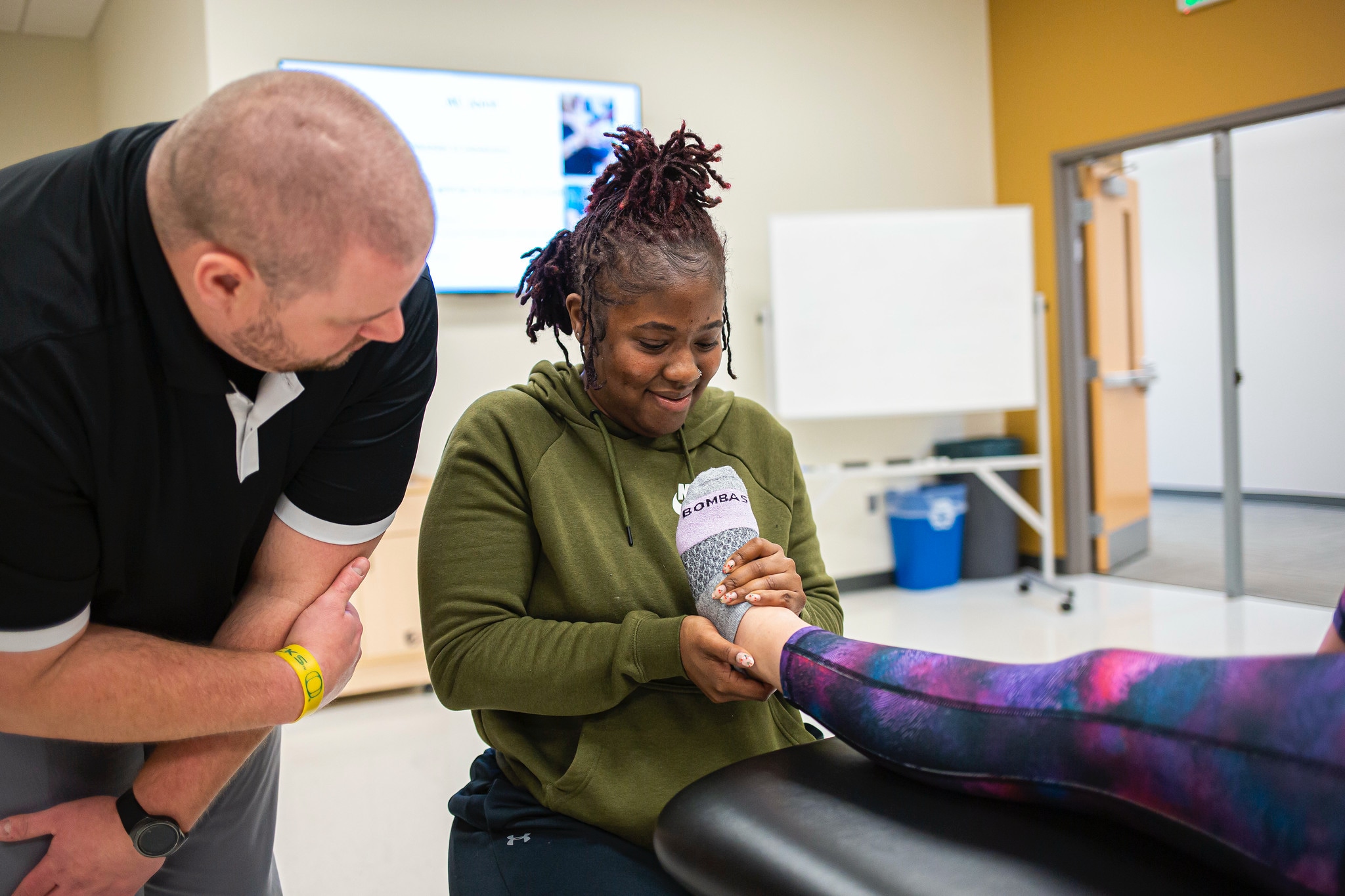
FAQs About the Master of Athletic Training Degree
What is an Athletic Trainer?
What can I do with an athletic training master’s degree?
Athletic trainers are often the first health care professionals on the scene when injuries occur. They are trained to evaluate, assess, and provide immediate care, playing a vital role in injury prevention, clinical diagnosis, and therapeutic intervention. Their work helps reduce long-term health care costs and improves the well-being of individuals recovering from musculoskeletal injuries and medical conditions tied to physical activity.
Students graduating from Manchester University’s CAATE-accredited athletic training program are equipped with the skills to provide comprehensive patient care, lead in clinical evaluation, and contribute meaningfully to any health care team. The curriculum is designed around the development of patient-centered care and practical experience through clinical settings and simulation labs.
After earning your athletic training degree, you may pursue roles as a director of sports medicine, clinical athletic trainer, physician extender, or specialist in orthopedics or neurology. According to the National Athletic Trainers’ Association (NATA), the average athletic trainer salary for those with a master’s degree is approximately $56,347, and demand is expected to grow substantially in the coming years.
Whether you’re called to work in education, sports medicine, or corporate wellness, Manchester’s master’s program ensures that you are well-prepared to meet BOC certification requirements and succeed in this expanding profession.
Is the Master of Athletic Training program accredited?
Manchester University is currently accredited by the Commission on Accreditation of Athletic Training Education (CAATE), 2001 K Street NW, Third Floor North, Washington DC 20006 USA. The program is currently applying to the CAATE for a change in level of degree and is pending approval.
In compliance with U.S. Department of Education regulations 34 CFR 668.43 (a) (5) (v) and 34 CFR 668.43 (c) the Manchester University Athletic Training program acknowledges the curriculum meets educational requirements for the Board of Certification (BOC) examination, recognized as the required examination for professional regulation in all states.
CAATE accreditation validates the athletic training education you’ll receive and ensures the program meets the national standards required for entry into the profession. Attending a CAATE-accredited professional program is essential because it qualifies graduates to take the Board of Certification (BOC) certification examination, which is required to practice as a BOC certified athletic trainer. Accreditation also signals that the program offers high-quality clinical experiences, access to advanced simulation labs, and a curriculum grounded in evidence-based practice. Students benefit from small class sizes, faculty mentorship, and opportunities to render service in diverse clinical
settings.
Manchester’s MAT program prepares health care professionals with a strong foundation in therapeutic modalities, patient-centered care, and interprofessional collaboration. This focus helps ensure that students are equipped to manage medical conditions, perform effective clinical diagnosis, and contribute meaningfully to any health care team.
By choosing a CAATE-accredited athletic training master’s program, you are taking a critical step toward long-term success and professional mobility in the growing field of sports medicine.
What kind of hands-on experience will I get?
In addition to fieldwork, students use cutting-edge simulation equipment for therapeutic intervention and clinical evaluation. Tools include therapeutic lasers, electrical stimulation devices, and concussion management technology. You’ll gain experience performing real-time assessments and rehabilitation strategies aligned with the expectations of today’s health care professionals.
What sets Manchester apart is its scheduling: athletic training students can focus solely on clinicals during each rotation. This structure provides deeper engagement with preceptors, improved continuity in patient-centered care, and increased confidence in delivering services provided in sports medicine clinics, hospitals, and beyond.
Whether you’re treating athletic injuries, managing medical conditions, or helping prevent workplace accidents, the MAT program equips you with the clinical practice foundation and technical knowledge to succeed in today’s competitive health care field.
What is the career outlook for athletic trainers?
With a master’s degree in athletic training, you’ll be well-positioned to meet this demand. Manchester University’s athletic training program combines clinical experiences with rigorous academic preparation to ensure graduates are competitive in the job market. Students are trained to assess, diagnose, and treat injuries while also focusing on patient-centered care and injury prevention.
Graduates find work in schools, sports medicine clinics, orthopedic settings, and professional sports organizations. Some even go on to advanced roles in clinical practice, such as physician extenders or directors of sports medicine. Others specialize in orthopedic care, concussion management, or therapeutic intervention within the broader health care team.
As states increasingly require a master’s program for certification, Manchester’s CAATE-accredited MAT program gives you the credentials and confidence to lead in a growing and evolving profession.
What educational background is needed to apply to the program?
All students must complete specific prerequisite courses prior to enrollment in the professional program. These typically include human anatomy, physiology, kinesiology, and related coursework in health or biological sciences. Completing these courses helps ensure students are academically prepared for the MAT’s rigorous clinical coursework and graduate-level research.
Students are expected to have completed the program prior to their intended start term and meet all admission requirements, including submission of an online application, transcripts, and letters of recommendation. Prospective students should also be in good standing with their previous institutions.
By accepting students from diverse academic backgrounds, Manchester’s program encourages future health care professionals to bring a range of perspectives into the field of athletic training education, enriching the learning environment and ultimately improving care delivery across various clinical settings.
What should I expect during the program, and how can I succeed?
As part of the continuing accreditation process with CAATE, the program undergoes regular evaluations to ensure its content remains aligned with national standards and evolving health care needs. Students benefit from up-to-date training in human movement, therapeutic intervention, and clinical diagnosis using cutting-edge equipment. This ensures they gain experience that directly translates to their future professional settings, whether in high schools, orthopedic clinics, or sports medicine facilities.
To successfully complete the program, students must demonstrate competency in five key domains of athletic training, actively participate in all clinical immersions, and pass the Board of Certification (BOC) exam. Support from faculty mentors, dedicated preceptors, and small cohort sizes makes Manchester’s program uniquely positioned to help students meet and exceed these goals
Master of Athletic Training Learning Outcomes
Program Learning Outcomes
1. Prepare individuals who are committed to a career as a Certified Athletic Trainer.
Student Learning Outcomes:
- Students will matriculate through the Athletic Training Program within two years.
- Graduates will pass the Board of Certification (BOC) Exam within two attempts.
- Graduates will secure employment as athletic trainers within six months of graduation.
2. Train students who demonstrate the knowledge, skills, and clinical abilities that will prepare them for entry-level practice as an athletic trainer.
Student Learning Outcomes:
- Students will demonstrate the ability to promote healthy lifestyle behaviors with effective education and communication to enhance wellness and minimize the risk of injury and illness.
- Students will demonstrate the ability to implementing systematic, evidence-based assessments and evaluations to formulate valid clinical diagnoses and differential diagnoses to determine a patient’s plan of care.
- Students will recognize and manage critical incidents while integrating best practices in immediate and emergency care for optimal outcomes.
- Students will demonstrate the ability to rehabilitate individuals with a health condition (i.e., injury, illness, general medical condition) with the goal of achieving optimal activity and participation levels based on core concepts (i.e., fundamental knowledge and skillsets) using the applications of therapeutic exercise, modality devices, and manual techniques.
- Students will demonstrate the ability to integrate best practices in policy. construction and implementation, documentation and basic business practices to promote optimal patient care and employee well-being.
- Students will demonstrate professional behaviors (e.g., ethical, moral, legal) consistent with professional and employment expectations for entry-level athletic trainers.
3. Develop students who will collaborate as a member of an inter-professional healthcare team while providing evidence-based, patient-centered care.
Student Learning Outcomes:
- Students will demonstrate verbal and written communication skills to effectively work with stakeholders with a variety of backgrounds.
- Students will use appropriate patient-centered clinical questions to identify and critically appraise current literature that guides their decision-making.
- Apply the available evidence and patient goals and values to implement current, safe, and effective patient care for complex issues.
- Students will recognize the need for referral to another healthcare provider and develop an interprofessional care plan.
- Students will incorporate patient-oriented outcomes to evaluate the quality of care they provide.
- Students will evaluate the various determinants of health (e.g., social, economic, environmental, biological, policy/law, cultural) which may affect community healthcare.
4. Ensure Faculty and Students’ professional engagement and serve the community in which they live.
Student Learning Outcomes:
- Faculty and students will serve the community by participating in volunteer activities each academic year.
- Faculty and students will be engaged in the profession as demonstrated by regular engagement in scholarly activities (e.g., conference attendance, presentation, publications).
5. Deliver a comprehensive curriculum that provides students with knowledge, skills, and clinical abilities that encompasses the scope of athletic training practice.
Faculty Objectives:
- Provide exemplary, diverse clinical education experiences that encompass the totality of athletic training practice.
- Preceptors will engage in professional development activities to demonstrate contemporary expertise in their area of teaching/clinical practice. – contemporary expertise tables.
- Preceptors will provide quality instruction to students.
6. Secure/maintain accreditation from the Commission on Accreditation of Athletic Training Education (CAATE).
Faculty Objectives:
- Faculty will maintain annual accreditation from the Commission on Accreditation of Athletic Training Education (CAATE).
Mission and Vision
-
Mission
The mission of the Master of Athletic Training (MAT) Program at Manchester University is to prepare person-centered, evidence-based athletic trainers, who actively seek to improve the lives of others by serving their profession, patients, and greater community with integrity and respect.
Vision
Our vision demonstrates our aspirational goal, what we strive for as a program: The Manchester University Athletic Training Program will graduate students with ability and conviction to provide patients with professional, evidence-based care.
Non-Discrimination in the Admission Process
Manchester University is committed to non-discrimination in campus life. The University does not discriminate on the basis of national origin, ancestry, race, color, age, sex, gender identity or expression, sexual orientation, familial status, religion, disability or veteran status in admissions or any area of campus life, including its educational programs, scholarships and loan awards, residence life programs, athletic programs, extracurricular programs, promotion and tenure policies and practice, and alumni affairs.
Manchester University is committed to carry out the provisions of Section 504 of the Rehabilitation Act of 1973 and the Americans With Disabilities Act, which provide for accessibility of University programs to the physically disabled.





